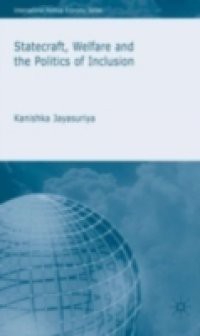Novel and innovative welfare strategies, which are often linked to policies promoted by supra-national agencies such as the World Bank, the OECD and the EU, have heralded the emergence of a new social policy climate in countries as diverse as Korea, Brazil, the UK and Thailand. Is this the end of neo-liberalism, or merely crocodile tears? Jayasuriya argues that neither is the case, and that these forms of welfare governance provide a logic and rationale for the social policy agenda distinctive of the neo-liberal market model. This amounts to socialization of the neo-liberal model with its own distinctive political language and institutions, and is likely to be the distinctive feature in the global political arena. The book locates this social politics within the transformation of the older 'idea of welfare', marking a shift from social democratic notions of social protection, to welfare as economic participation and inclusion.

